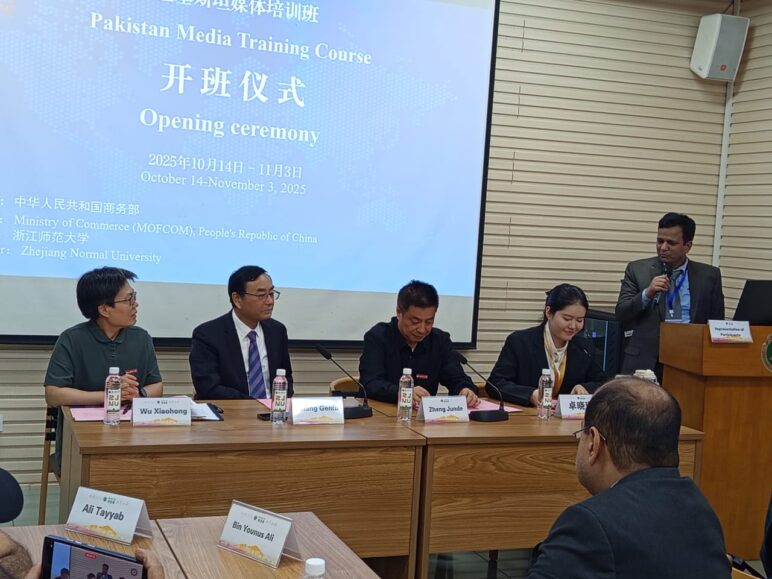As I landed in Jinhua, China, one thought kept circling in my mind throughout the day: How did China achieve such remarkable development, especially when it gained independence just two years after Pakistan? My curiosity was soon answered by a professor who simply said, “Science and democracy come after independence.” Those few words carried profound meaning—they explained much of China’s transformation from a struggling nation into a global power.
Before going further, let me share the context. I am currently in China as part of a 17-member delegation of Pakistani journalists attending a 21-day training program in Jinhua—a city renowned for its history, culture, and innovation. The program is organized by Zhejiang Normal University (ZNU) in collaboration with the Ministry of Commerce of China and the Chinese Consulate in Karachi.
Day One in Jinhua
We arrived in Jinhua early on Tuesday morning, October 14. After a brief rest, we headed to Zhejiang Normal University, where our hosts awaited us at the School of Design and Creativity. Among those present were Professor Zhang Genfu, Vice President of ZNU; Professor Zheng Junde; Ms. Wu Xiaohong; and Ms. Victoria, all of whom extended a warm welcome.

Our first session began with an introduction to the basics of the Chinese language, delivered enthusiastically by Professor Zheng Junde. Learning even the simplest Chinese expressions felt like unraveling layers of culture and art. As Jawaharlal Nehru once said, “There is a great country in the world, every word of whose language is as elegant a poem and as beautiful a painting—this country is China.” Similarly, Chinese novelist Wang Xiaobo described language as something that “shines like the crystalline light of the stars.”
While it was challenging to grasp the depth of the “elegant poems” hidden within Chinese characters in such a short time, the session gave us a glimpse of the linguistic richness and cultural depth that define China.
After a short break, the official opening ceremony began. Mr. M. Ehtisham, Editor of Metro Morning (Karachi), represented our group and spoke on behalf of the participants. Following his remarks, Professor Zhang Genfu delivered an insightful lecture on “The Basic National Conditions of China.” He took us through the country’s historical journey—from the socialist revolution to the Great Leap Forward, through domestic challenges, and finally to the era of reforms, modernization, and prosperity. His lecture provided a clear picture of how China built its foundation through discipline, long-term planning, and the integration of science and innovation into governance and education.
By 5 p.m., our first day of learning came to an end, followed by a welcome dinner arranged by our hosts. Throughout the day, we were assisted by Ms. Victoria and Ms. Annie—two energetic, capable, and kind-hearted Chinese officials who ensured that every aspect of our stay—from translation and transport to meals and shopping—was smooth and enjoyable.
That first day in Jinhua not only marked the beginning of our training program but also offered an eye-opening introduction to China’s story—how a nation’s commitment to science, education, and disciplined governance can turn challenges into opportunities.
To be continued…


best marijuana for sleep products with soothing thc blends